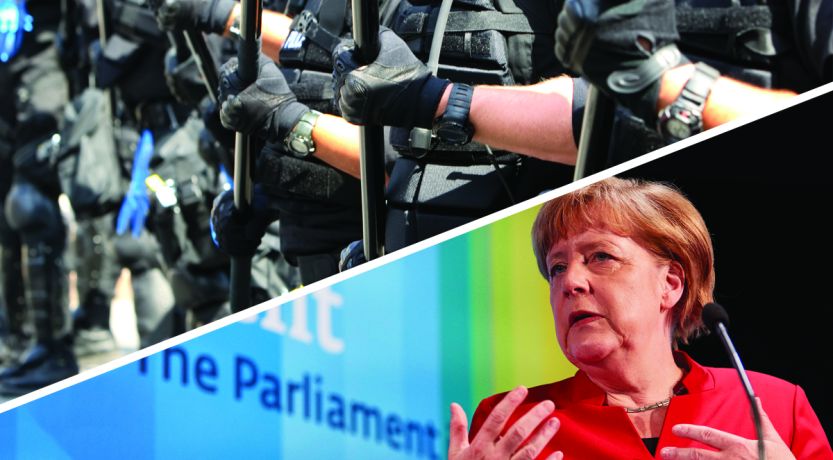2 Prophetic Trends We Can’t Ignore
Major shifts are occurring around the world that will affect your life. Here are two prophetically significant trends you need to be aware of.

Jesus tells us to “watch” (Luke 21:36), and part of that includes recognizing important world news trends. We subscribe to some of the best news magazines published to gain a broad, global perspective of what is happening in today’s world. One periodical that provides excellent, in-depth analysis of global conditions is Foreign Affairs.
As I was paging through the July/August 2016 issue, I was struck by the number of articles relating to end-time trends prophesied in the Bible. The authors were good at recognizing the problems, but they weren’t able to see the prophetic perspective and the solutions explained in the Bible.
In this blog post I will highlight two of those trends. I believe these two themes are essential to understanding our world as it relates to Bible prophecy.
Two important prophetic trends to watch
1. An increase in global conflicts and authoritarianism.
One of the primary themes of end-time Bible prophecies is global violence and instability. In the Olivet Prophecy, Jesus spoke these words about the time preceding the Great Tribulation and His return: “And you will hear of wars and rumors of wars. See that you are not troubled; for all these things must come to pass, but the end is not yet. For nation will rise against nation, and kingdom against kingdom” (Matthew 24:6-7).
One of the primary themes of end-time Bible prophecies is global violence and instability.
Christ’s 2,000-year-old prophecy is an apt description of the state of today’s world. Much of the current edition of Foreign Affairs discusses conflicts around the globe.
An article titled “Israel Among the Nations” by Robert M. Danin describes the chaos that surrounds the State of Israel on every side: “A bloody and devastating civil war rages in Syria, where the regime of Bashar al-Assad and the jihadists of the Islamic State (also known as ISIS) seem intent on outdoing each other in brutality. Neighboring Jordan … is now struggling under the burden of hosting more than a million Syrian refugees. And ISIS and other jihadist organizations roam the virtual no man’s land of the Sinai Peninsula” (p. 28).
Interestingly, the current Middle East turmoil has seemingly strengthened Israel’s position, as other Middle Eastern nations are more concerned about Syrian refugees, ISIS and the Iranian military threat than Israeli/Palestinian issues. Right now, the greatest threats Israelis face are from so-called “lone wolf” attacks—usually individuals harming Israeli citizens with knives or automobiles.
But this time of relative security for the State of Israel is delicate, as history has shown that the situation in the Middle East can change very abruptly.
One reason, pointed out multiple times, for the increase in conflicts is the retreat of democracy around the world.
2. Germany’s increasing global role.
The current edition of Foreign Affairs also features a very interesting article titled “Germany’s New Global Role” by German Foreign Minister Frank-Walter Steinmeier. The article describes how Germany has emerged as the most stable and powerful nation in Europe. Germany is not just the undisputed economic leader of Europe, but it is also becoming a bigger diplomatic player in global affairs, “contributing diplomatically to the peaceful resolution of multiple conflicts around the globe” (p. 106).
Mr. Steinmeier points out that the United States and Europe have continually retreated from their roles as global leaders in the last decade—leaving a vacuum that has contributed to the retreat of democracy, the rise of authoritarian regimes and the rise of sectarian and national conflicts. This retreat has allowed regions to become destabilized; conflicts to spread; and nations like China, India and Russia to flex their muscles as significant regional and global powers.
“Against this backdrop,” Mr. Steinmeier writes, “Germany has remained remarkably stable” (p. 108). Germany has maintained its economic strength throughout the global recession and has maintained its focus on export-driven economic growth. Slowly and cautiously, Germany is taking a more assertive role in global affairs. With the retreat of the U.S. and the tenuous state of the European Union, Germany is seen by many as an “indispensable nation” (p. 113).
The rise of Germany as a dominant power within Europe is a major trend to watch.
A June 5 New York Times article points out that “Germany is showing signs of growing more comfortable with embracing a bigger military role, a gradual but distinct shift away from an instinctive pacifism that took hold starting in 1945, and a post–Cold War tendency to shrink the nation’s military.”
Multiple news agencies are reporting that Germany has prepared a government white paper detailing its intention to boost its military role as it prepares to emerge as a “key player” with a responsibility to “actively help shape the global order.” Germany and France are also making plans to cooperate more closely on the military defense of Europe.
The rise of Germany as a dominant power within Europe is a major trend to watch. Many prophecies reveal the rise of a new European power that will replace the English-speaking nations as the world’s dominant superpower. This European power will unite Europe through an alliance between a strong political leader (arising from Germany) and a charismatic religious leader (based in Rome).
To learn more about these prophetic trends, read “The European Dream: “Bound by Fate?” and “All Roads Lead to Berlin.”
We must watch!
Jesus admonished us to “watch” and “pray” (Luke 21:36). This includes keeping an eye on world news and trends to “discern the signs of the times” (Matthew 16:3). We have prepared many resources to help you do that.
Here are some resources we think you will find helpful:
- Discerning the Signs of the Times
- Five Prophetic Trends to Watch
- The Book of Revelation: The Storm Before the Calm
Date Posted: June 29, 2016



